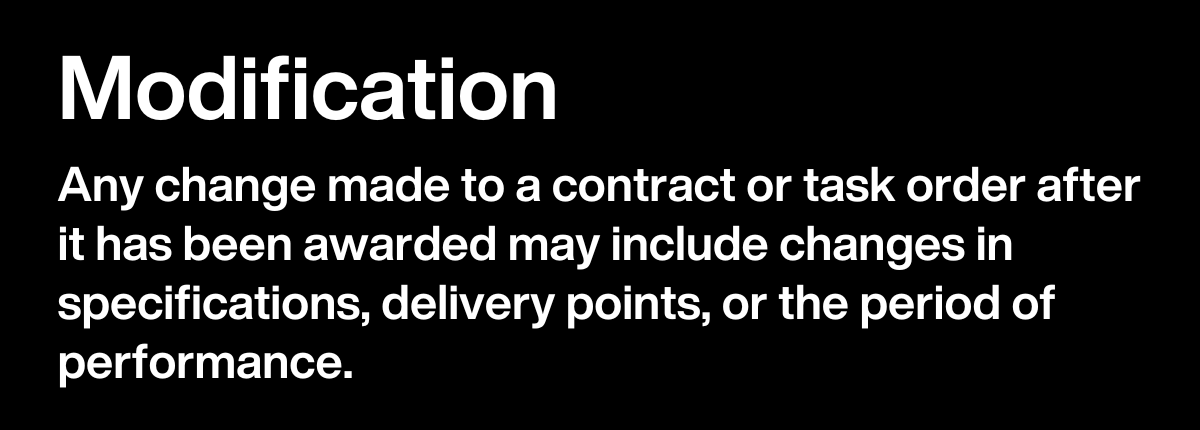
Navigating Modifications in Government Contracting
Government contracts are dynamic instruments, subject to changes that reflect the evolving needs and circumstances of the government and its contractors. Modifications play a crucial role in this environment, allowing for adjustments to contract terms, conditions, specifications, or prices. This article delves into the concept of modification within the realm of government contracting, outlining its types, processes, implications, and best practices for effective management.
What is a Modification?
A modification in government contracting is an official change to the terms of a contract after it has been awarded. These changes can be initiated by either the government or the contractor and must be mutually agreed upon, except in certain cases where unilateral modifications are permissible.
Types of Modifications
Modifications can broadly be categorized into two types: unilateral and bilateral.
Unilateral Modifications are changes made by the government without the contractor's consent, often reserved for administrative adjustments or changes within the government's rights under the contract clauses (e.g., the Changes clause).
Bilateral Modifications involve mutual agreement between the government and the contractor. These modifications often pertain to substantive changes in the contract's scope, price, or terms and conditions.
Common Reasons for Modifications
Modifications can occur for various reasons, including:
Scope Changes: Adjustments to the work required under the contract due to evolving needs or unforeseen challenges.
Time Extensions: Modifications to extend the contract's performance period, often due to delays or changes in project scope.
Price Adjustments: Changes to the contract price due to scope modifications, unforeseen costs, or corrections of errors.
Administrative Changes: Updates to administrative details, such as payment terms, contract clauses, or points of contact.
The Process of Making Modifications
The process for making modifications varies depending on the type of modification and the specific terms of the contract. Generally, the process involves:
Identification of Need: Either party identifies the need for a modification and communicates this need to the other party.
Negotiation: For bilateral modifications, the parties negotiate the terms of the change, including scope, price, and impact on the contract schedule.
Documentation: The modification is documented in a formal contract amendment or modification document, detailing the changes and their impact on the original contract.
Approval: The modification must be approved by authorized representatives from both parties. In the case of unilateral modifications, the government exercises its contractual right to make the change, notifying the contractor accordingly.
Implementation: Once approved, the modification is implemented, and the contract is performed according to the revised terms.
Implications of Modifications
Modifications can significantly impact a government contract, affecting its performance, cost, and completion timeline. Properly managed modifications can ensure that the contract continues to meet the government's needs while remaining fair to the contractor. However, poorly managed modifications can lead to disputes, cost overruns, and project delays.
Best Practices for Managing Modifications
To effectively manage modifications in government contracting, both parties should:
Maintain Open Communication: Regular communication can help identify potential needs for modifications early, facilitating timely adjustments.
Document Thoroughly: All modifications should be thoroughly documented, including the rationale, negotiated changes, and impact on the contract.
Understand Contractual Rights and Obligations: Both parties should fully understand their rights and obligations under the contract, including provisions for making modifications.
Seek Legal and Contractual Advice: Especially for complex modifications, seeking advice from legal and contracting professionals can help ensure compliance with laws and regulations.
Plan for Contingencies: Anticipating potential changes and including flexible terms in the initial contract can reduce the need for modifications later.
Conclusion
Modifications are a vital aspect of government contracting, reflecting the need for flexibility and adaptability in fulfilling government requirements. Effectively managing modifications requires a clear understanding of the processes, types, and implications involved. By adhering to best practices for negotiation, documentation, and communication, government agencies and contractors can ensure that modifications serve their intended purpose, facilitating successful contract execution amidst changing circumstances. Through careful management of modifications, government contracts can remain dynamic instruments that adeptly serve the public interest while ensuring fairness and transparency for all parties involved.
Whenever you’re ready, there are 3 ways we can help you:
1. Are you serious about finding the next opportunity? Become a GovBrew Insider member to keep your pipeline full. Weekly opportunities, recompete reports, agency forecasts, and much more.
2. Promote your brand to over 6,400 GovCon professionals by sponsoring our newsletter. Apply here
3. Follow us on LinkedIn for more GovCon coverage.
